- Home
- Anne Bennett
Mother’s Only Child
Mother’s Only Child Read online
Mother’s Only Child
Anne Bennett
To my youngest daughter Tamsin, with all my love
Table of Contents
Cover Page
Title Page
Dedication
Chapter One
Chapter Two
Chapter Three
Chapter Four
Chapter Five
Chapter Six
Chapter Seven
Chapter Eight
Chapter Nine
Chapter Ten
Chapter Eleven
Chapter Twelve
Chapter Thirteen
Chapter Fourteen
Chapter Fifteen
Chapter Sixteen
Chapter Seventeen
Chapter Eighteen
Chapter Nineteen
Chapter Twenty
Chapter Twenty-one
Chapter Twenty-two
Chapter Twenty-three
Chapter Twenty-four
Chapter Twenty-five
Chapter Twenty-six
Chapter Twenty-seven
Chapter Twenty-eight
Chapter Twenty-nine
Acknowledgments
About The Author
Other Books By
Copyright
About the Publisher
CHAPTER ONE
Maria Foley almost ran across The Square that day in late July 1941. The faint summer breeze riffled through her long wavy hair, tied back loosely with a ribbon the same green as her eyes. Bella McFee, catching sight of the girl, stepped out of the post office-cum-grocery shop when she saw the envelope in Maria’s hand.
‘It’s come then?’
‘Aye,’ Maria said. She tried to keep the elation out of her voice. ‘I’ve passed.’
She saw Bella’s lips purse in disapproval and, for a moment, Maria was resentful. She’d worked for Bella in the shop for two years. Couldn’t she just say she was the tiniest bit pleased? Congratulate her even?
Her mother, Sarah, had said the right words—‘Congratulations. You’ve done well’—but in a flat, expressionless and totally insincere tone. However, what Bella did say was, ‘I’m away to see your mother. She’ll likely be feeling low after this. Mammy will mind the shop. And where are you off to in such a tear? You’re not due in till nine.’
‘The boatyard,’ Maria said. ‘I want to see Willie.’
‘Oh, he’d like to know right enough,’ Bella said. ‘But you, Maria, aren’t you the tiniest bit ashamed, wanting to go to some fancy academy in Dublin just now, when you could be a help and support to your mother? Have you no thought for her, and you an only one too?’
Immediately, guilt settled between Maria’s shoulder blades. It isn’t my fault I’m the only one, she wanted to cry. That was the main problem, of course. If her mother had had a houseful of children, she could have taken pride in the fact that her eldest daughter had won a scholarship to the Grafton Academy in Dublin to study Dress and Fabric Design for two years.
But Sarah’s fall down the stairs when Maria had been just eighteen months old had killed the child she was carrying and assured there would be no more either. It had also, so it was said, given her ‘bad nerves’. Maria hadn’t known what ‘bad nerves’ were then, of course, although she knew her father was never willing to upset her mother and strongly discouraged Maria from saying or doing anything that might disturb her at all. She was well aware that the news that morning would have disturbed her greatly, and yet she couldn’t help being pleased and, yes, proud of herself. She knew Willie would congratulate her warmly and, oh God, how she needed someone on her side for once.
‘Mammy should never have let me go in for the exam if she can’t take any joy in the fact that I have passed it,’ Maria said.
‘You don’t understand anything yet, girl,’ Bella said sharply.
Maria flushed at the sharp tone and then tossed her head a little defiantly and said, ‘I have to go, or I’ll be late getting to the shop.’
Before Bella could say another word, Maria gave her a desultory wave and ran over the green to the coastal path, which ran to Greencastle, the next village up Inishowen Peninsular. It was the path her father used to take every day bar Sunday, when he’d owned a boatyard in the small village. Now he worked at the Derry docks, and Willie Brannigan was put in charge of the Greencastle boatyard. He’d known Maria since the day of her birth and she knew he’d wish her well.
She paused on the banks of Lough Foyle, the sun, warm on her back from a cloudless sky, glittering on the water. Well, what could be seen of the water. The lough was so filled with naval craft, she could barely see Milligan’s Point on the further side, the side the British still owned. She couldn’t see the airports at Limavady and Eglinton either, but she knew they were there. It was a fine sight to see the aircraft flying above the flotilla of naval vessels on convoy duty. Her father said they were more effective at sinking German U-boats than the ships. The British-owned six counties had been dragged into the war along with Britain, but the Free State, Maria’s side of the border, had declared itself neutral and Maria knew there were soldiers from the Irish Army stationed at Buncrana, which was the other side of the peninsular, to try to ensure the Germans respected that neutrality
She gave a sigh and made her way to the boatyard. For a moment she wished Greg Hopkins was just a couple of miles away on his father’s farm and she could rush to him with her news, for he was another one who believed she was doing the right thing. He was in the army now and, though she was proud of him, she missed him sorely. Letters couldn’t make up for his absence.
It was strange how she and Greg had always been such friends, because Greg hadn’t been born in Inishowen at all, but in Birmingham, England, where his father came from, though his mother was from Moville.
The whole family had arrived in 1934 when Greg’s mother inherited a farm from an uncle. Maria had only been nine, and Greg thirteen, but she remembered the lost and unhappy boy he was then, who made no effort to make friends. He was like a fish out of water, her mother would say.
‘But, why come here?’ Maria had asked him one day, when he had been there more than a year and was ready to leave school. ‘It seems such an odd thing to do, when you were not born and bred for it.’
Greg had shrugged. ‘Dad hadn’t worked for two years when we came here. He wasn’t the only one, or owt. Many like him were hit by the slump. We were on our beam ends, nearly starving, and when we got the news about the farm out of blue, Dad said it was like a miracle. He’s pulled the farm round and it’s doing all right. At least we all get enough to eat.’
‘Do you like farm work?’
‘I hate it,’ Greg had said fiercely. ‘And I hate this little village—in fact, the whole of Inishowen—and one day I’ll go back to Birmingham. I know I’ll have to wait a while; Phil is only just ten, Billy two years younger still—the girls don’t count—and they wouldn’t be able to be much of a hand to our dad. Anyway, there’s no work for anyone much in Birmingham at the moment, but I don’t intend to stop here all the days of my life.’
But, while Greg had waited, he found Maria to be a fine distraction, especially as she grew and began attending the socials held for the young people at the church. There he danced with her many times, often walked her home and sought her company after Mass.
‘You have an admirer,’ Sarah said. She knew nothing of Greg’s restlessness. All she saw was that Greg was the eldest son and set to inherit the farm, and the family were respectable and God-fearing. If her daughter was to marry Greg Hopkins, Maria would live not far from her parents at all, and that would fulfil Sarah’s dream.
Maria wasn’t ready for any sort of relationship. ‘Don’t be silly, Mammy, he’s just bein
g kind,’ she said. ‘He’s the same with everyone.’
That morning, though, she so wished he was there to tell her news to.
There was another person she wished was still in Moville. Philomena Clarke had been the tutor at the evening classes for dressmaking who had recognised Maria’s quite exceptional talent and knew that she had the chance of winning a scholarship to the Academy. They had gone together to the college in Derry for Maria to take the exam in May, and she had even promised she would travel down to Dublin with her and settle her in.
However, life had a hammer blow waiting to hit Philomena, for the day after the exam she had a telegram from New York from the husband of her twin sister, who had been badly injured in a car accident and was asking for her. Philomena was gone within days and a little after she had left, Maria had a letter from her. Her sister had died, leaving the husband distraught, and she had decided to stay to help him rear his three small children, who were devastated and traumatised by the tragedy.
Maria was touched that even in the middle of that appalling upheaval and upset, while still grieving for her sister, she still had a thought in her head for Maria.
‘Please write and tell me as soon as you get news from the college,’ she had pleaded in her first letter to Maria. ‘I will be on tenterhooks until I hear from you.’
Maria would write to both Greg and Philomena that very night, she decided, and she walked on, composing the letters in her head as she went.
Bella found Sarah in the scullery, washing the breakfast dishes, her red-rimmed eyes betraying the tears she’d shed. Visibly she tried to take a grip on herself when she saw Bella.
‘Shall I make a cup of tea?’ she said. ‘Have you time?’
‘Aye, Mammy’s seeing to the place and Maria will be there at nine.’
‘Maria!’ Sarah said plaintively. ‘What will I do when she leaves, Bella? I’ll be destroyed.’
‘No, you won’t!’ Bella said emphatically. ‘I’ll see you’re not.’
Bella remembered the time Sam Foley had brought his young wife back into the village to live. She’d been only young herself then, and, though married for eight years, she was still childless. Her frustrated maternal instinct was stirred by Sarah, who was only seventeen and looked such a frail and delicate wee thing, with her blonde hair and big blue eyes. The two became good friends.
‘Tom Tall and Butter Ball,’ Bella used to call the two of them, for though Sarah wasn’t that tall, her slenderness made her appear so. Bella was, like her mother, under five foot and ‘as wide and she was high’, she was fond of saying. That wasn’t strictly speaking true, but she was plump and her mother, Dora Carmody, stouter still. Everything about them was round, but their faces were open and friendly and their brown eyes kindly looking. Bella had once had dark blonde hair, but now it was as grey as her mother’s and, like hers, fastened into a bun.
Sam Foley, being the third son, had never thought to inherit the boatyard in Greencastle, nor the family house in nearby Moville. Knowing there would be no opening for him in the family business, his father had apprenticed him to a carpenter friend, who ran his business from a small town called Belleek, in the neighbouring county of Fermanagh, when Sam had been twelve years old.
Sarah Tierney’s family lived not far from the village, on a thriving farm in Derrygonnelly on the banks of the huge Lough Erne, and Sarah often shopped in Belleek with her sisters, Peggy and Mary.
There she met and fell in love with Sam, and he with her. No obstacles were put in the way of her marrying him, for everyone liked the man and knew he was set to inherit the carpentry business, so it was generally thought that Sarah had done well for herself.
Sam’s family had come down for the wedding, and there Sam’s two brothers sought him out and told him they were off to seek their fortune in America as soon as it could be arranged. The boatyard was all his if he wanted it.
Sam wasn’t keen to go back and knew Sarah would be unhappy living so far away from her people, but he also knew his father couldn’t run the place alone. His only option was to return.
The only sweetener to that very bitter pill for Sarah was the house Sam inherited along with the boatyard. It was a fine, solid house just off The Square in Moville. It had two storeys, three bedrooms, and was built of stone with a slate roof. ‘A family house,’ Sam’s father had said. ‘Me and your mother will be fine and dandy in the wee cottage in Greencastle by the boatyard.’
‘I mind the day Sam’s brothers left as if it were yesterday,’ Sarah said to Bella as they drank their tea. ‘We hadn’t been in Moville more than a day or so and we went down to the pier to see them off. Sam had told me that the liners crossing the Atlantic had to be moored out in the deeper waters of Lough Foyle. Passengers were taken out to the ships in small tenders from Moville Pier. There was always a collection of people waiting and that day was no different.
‘Sam’s brothers seemed sorrowful yet, for all their sadness at the parting, they still left. When they climbed into that boat, Sam’s mother’s eyes were so bleak and bereft, I could hardly bear to look at her. The father was holding her fast, or I think she may have thrown herself into the boat after her sons. We waited at the pier side until we saw the small boat bump alongside the liner. The boys gave one last wave and we turned for home. Sam’s mother was crying gulping sobs of such sadness I felt my heart turn over. I thought I understood how she was feeling; I remember thinking I’d die if one of mine was to go such a distance away.’
She sighed and went on, ‘I tell you, Bella, children would tear the very heart out of you.’
However, more tragedy was to hit Sarah. She’d been married just six months when her mother and sisters, Peggy and Mary, took sick with TB. They were all dead before October drew to a close, before Sarah had been able to arrange to go and see them. She’d not even had the chance to bid them goodbye and she spoke of this now to Bella.
‘D’you mind that time?’
Bella remembered it well. Sarah’s grief had been so deep and profound, Sam had worried for her sanity. They travelled down for the funerals. Seeing everyone there so mournful and sorrow-laden had made Sarah worse.
‘Daddy was so sad it near broke my heart to see him,’ Sarah said to Bella. ‘He didn’t seem to see anything around him and it was up to my brother Sean to keep the farm ticking over.’
It was arranged that a widowed aunt called Agatha, whose children were grown and married, would see to things in the house and Sam and Sarah returned to Moville.
‘I never thought I’d be happy again in the whole of my life,’ Maria reminded Bella. ‘And then I found I was expecting. A little life would be dependent on me, something to go on for.’ She grasped Bella’s hand and went on, ‘You showed what a true friend you were then, for you showed not a trace of envy and yet I know how you had always longed for a child of your own.’
That brought the tears to Bella’s own eyes, for it was a burden she carried with her always.
‘When Maria was born, in 1925, I thought her the most beautiful baby in all the world,’ Sarah said, ‘and for sixteen years she has been at the forefront of my mind all the time. I love her so much, Bella, and I really can’t bear the pain of losing her. Once Maria leaves this village I know she will never come back to live.’
‘You will get through this, you know,’ Bella said. ‘It will take time, but it will get easier. I thought when my man died I’d never recover from it.’
‘That was a tragic time, right enough,’ Sarah agreed. It had been a tragic time for both of them. Sarah had just has the disastrous fall that rendered her sterile and was in the hospital. Bella was looking after the toddling Maria, when her husband, a fine, strapping man, who’d never had a day’s illness in his life, suddenly keeled over as he was getting up from his dinner, and was dead before he reached the floor.
‘We supported each other then,’ Bella said.
‘Aye, and wasn’t it wee Maria who was the salvation of us both?’
‘Sh
e was indeed,’ Bella agreed. ‘Then Mammy said she couldn’t manage the shop on her own and asked me in with her. I don’t know whether she really couldn’t manage, or did it for me, but I know the occupation of it was a good thing.’
‘I know it,’ Sarah said. ‘But what occupation could I take up that will chase the heartache from me?’
Bella had no answer to this and Sarah went on, ‘I knew that Maria was good at sewing and all. I mean, I taught her to sew, darn, embroider, that sort of thing, and in time she was better than me—far neater, and faster too. I knew she had an eye for colour, the things that go together. Whenever we went in the draper’s shops in Derry, she’d be fascinated by the array of fabrics. She’d feel them between her fingers and be amazed by the different things you could sew on to decorate clothes. She’d prowl around the haberdashery counter like another child might do around a cake shop.
‘I took it as a good, wifely attribute, especially when she mastered that old treadle machine. I told her she’d be a catch for any man, for you know she could make something out of nothing, and I encouraged her to go to evening classes for dressmaking. People say you can’t make a silk purse out of sow’s ear—well, I think Maria probably could.
‘She’s a tidy cook too—we all know the way to a man’s heart is through his stomach—and she’s helped me with the laundry this past year or so. She can poss the clothes, starch and iron with the best of them.’
She looked at Bella with mournful eyes and said, ‘She’ll make a good wife for someone in a year or two, when she is fully grown. That’s what I want for her—to marry a boy here so I can still see her and help her rear any children she might have. It’s all I’ve wanted since the first moment I held her in my arms, and if it hadn’t been for this damned war it would have happened like that. Whatever Philomena Clarke wanted, without the war, Maria going to the Academy would have been impossible.’
Bella knew that was true. By the time Maria finally left school at Easter 1939, everyone knew Britain, and therefore Derry and the other counties across the Foyle, was perched on the brink of war, despite Chamberlain’s claim that there’d be ‘peace for our time’, the previous September.

 As Time Goes By
As Time Goes By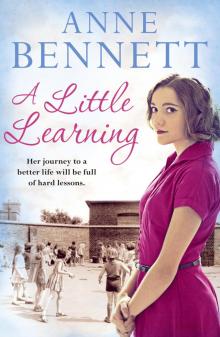 A Little Learning
A Little Learning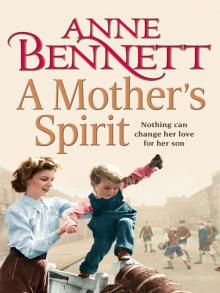 A Mother's Spirit
A Mother's Spirit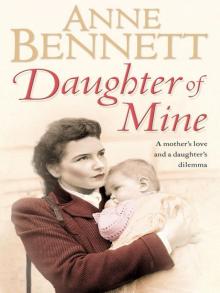 Daughter of Mine
Daughter of Mine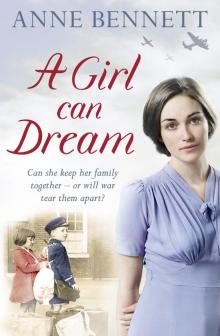 A Girl Can Dream
A Girl Can Dream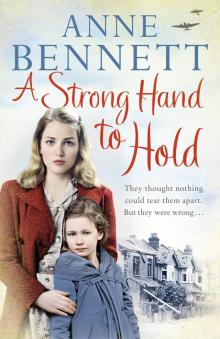 A Strong Hand to Hold
A Strong Hand to Hold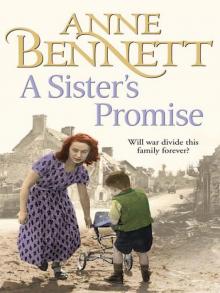 A Sister's Promise
A Sister's Promise To Have and to Hold
To Have and to Hold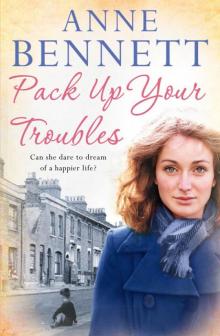 Pack Up Your Troubles
Pack Up Your Troubles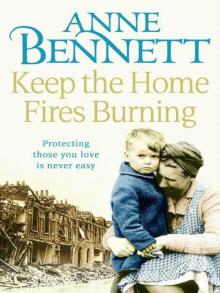 Keep the Home Fires Burning
Keep the Home Fires Burning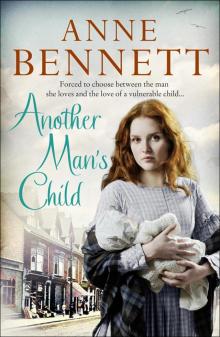 Another Man's Child
Another Man's Child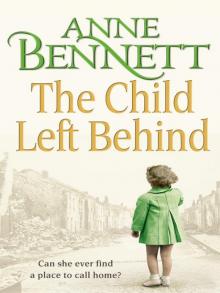 The Child Left Behind
The Child Left Behind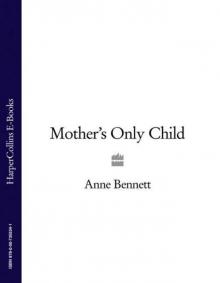 Mother’s Only Child
Mother’s Only Child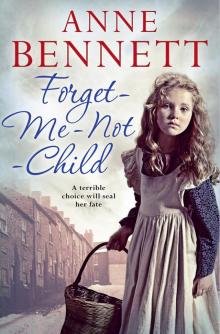 Forget-Me-Not Child
Forget-Me-Not Child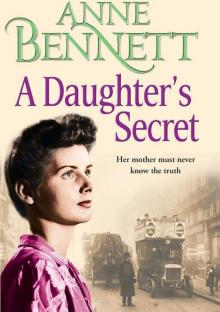 A Daughter's Secret
A Daughter's Secret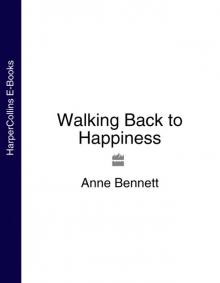 Walking Back to Happiness
Walking Back to Happiness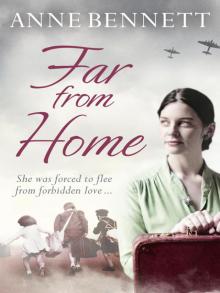 Far From Home
Far From Home Till the Sun Shines Through
Till the Sun Shines Through